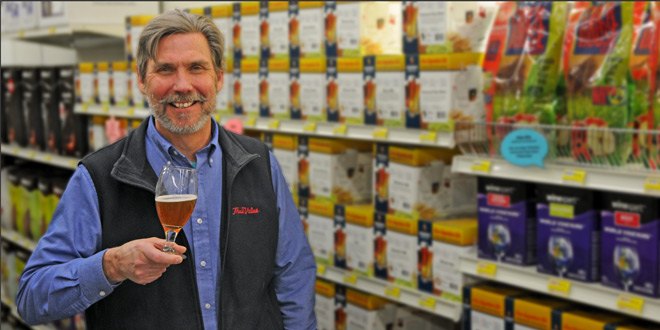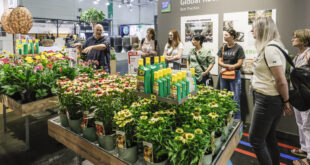To view a PDF of this story, click here.
By Renee Changnon, rchangnon@nrha.org
Tapping Into a New Niche
A walk into the aptly named Brewer’s True Value Hardware reveals an experience and some niche products most home improvement stores don’t offer.
Whether customers are seeking home improvement products or beer-making supplies, they can find both at the store.
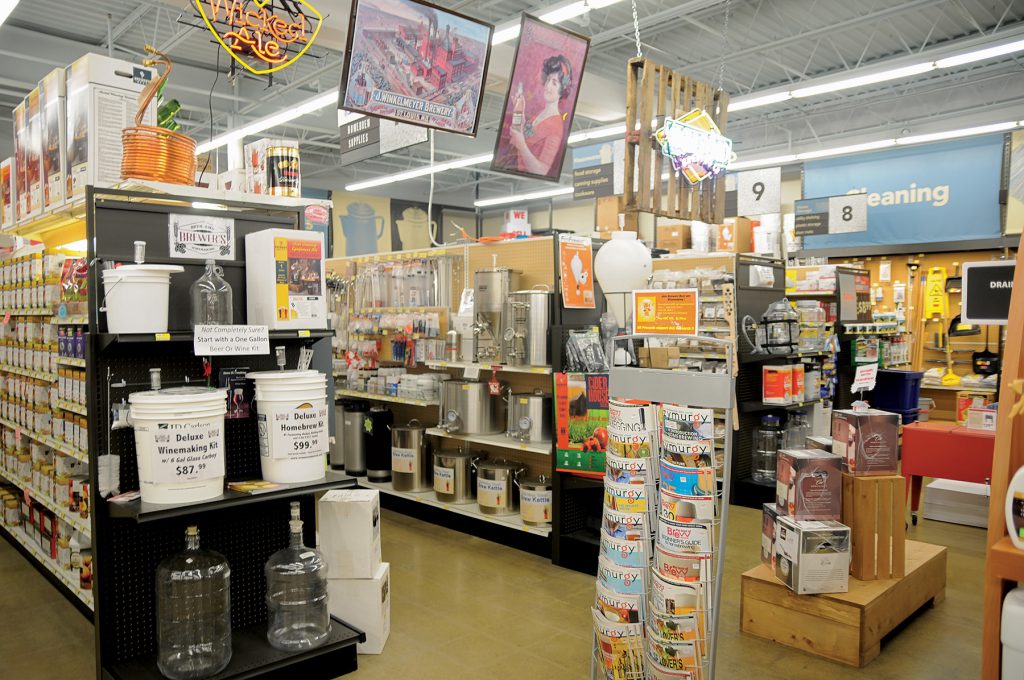
Located in St. Peters, Missouri, Brewer’s True Value sells everything that both a beginner or expert homebrewer could need. A section of the business features shelves carrying ingredients such as grains, hops (a bitter dried plant used to balance the sweetness of malted beers), as well as the glass bottles and bottling buckets for the beer-making process.
David Brewer, who opened the store in 2011, decided to try selling homebrewing products after one year in business. The niche has since become an important department for the store. Brewer now has a following of homebrewers who rely on him for the equipment and ingredients they need. However, they also look to him for expert advice.
The hobby isn’t new, but it is a growing trend that home improvement stores throughout the U.S. are capitalizing on. Whether it’s simply carrying a few homebrew starter kits or bringing in all the products a dedicated hobbyist would need, you can be successful and profitable in this niche if you go above and beyond simply stocking products on the shelf.
For this article, Hardware Retailing spoke with two different retailers who have built a following among homebrew hobbyists.
On the following pages, you will learn about how these business owners got into selling the niche. And you’ll discover what to consider before expanding or starting your own homebrew department. You’ll also learn about products to carry and the knowledge you and your employees will need to serve homebrewers.
Should You Sell Homebrew Products?
For retailers who haven’t sold homebrew items or are interested in expanding upon a small homebrew selection, it’s important to consider several factors before diving in.
As with any new niche or product line, there is a lot to determine before moving forward. This includes looking at the potential audience, the space required and the product knowledge you’ll need.
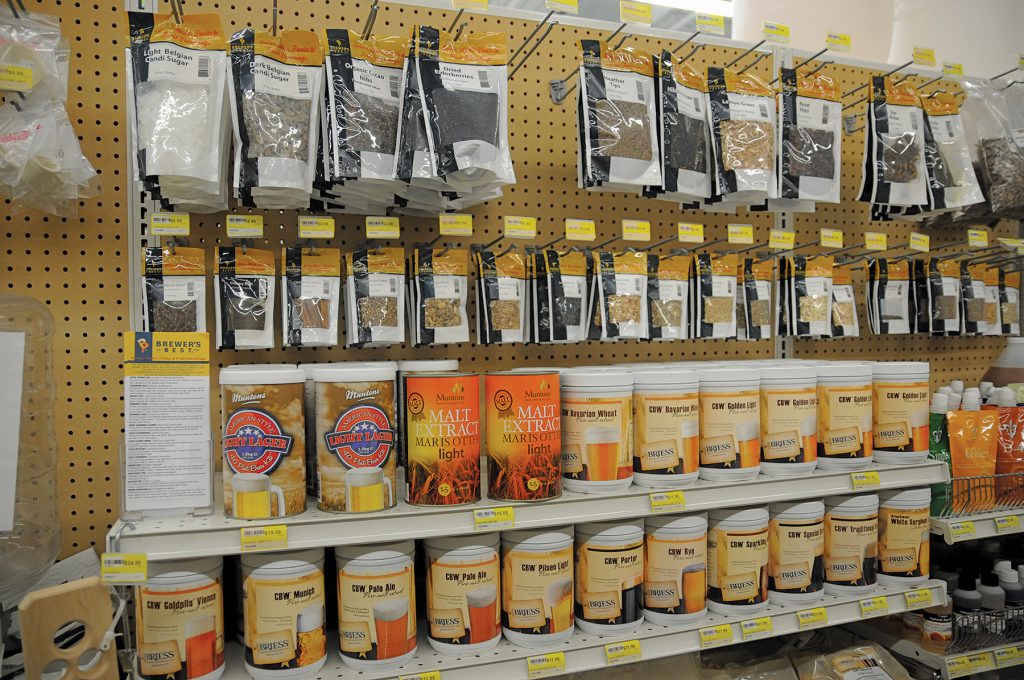
At Karp’s Hardware and Homebrew in East Northport, New York, homebrew has been a part of the business for more than 20 years. When store owner Alan Talman first added the category in 1995, he says it was a way to attract customers during the winter months.
However, his homebrew business is now just as competitive as any of his store’s core categories, Talman says.
“If you’re selling the homebrew hobby, but you’re not out in your community, meeting local homebrewers, attending events or don’t even know how to homebrew, you might as well be Amazon,” Talman says. “You need to have an employee who your customers can connect to homebrewing. Whether it’s you or another employee, this will make a big difference in establishing your business as a go-to spot for your homebrewer customers.”
Although Brewer’s True Value has offered a homebrew department for four years now, before entering the market, Brewer got some help building the department from an employee who was very skilled in the hobby. After looking at the need for homebrew products and seeing the lack of local places to buy them, it made sense to go for it.
“I started small in homebrewing because I wasn’t sure about the market,” Brewer says. “We’re in a suburban area. Since opening the department, I’ve expanded my salesfloor. Plus, I’ve gotten involved with the local homebrew organizations.”
Brewer suggests retailers investigate the local interest in the hobby before investing in the category.
“See if customers have another place to get their homebrew equipment,” Brewer says. “If not, I think it’s a great category for any home improvement business. If there is another local homebrew shop, think about what they have and what you would bring if you got in the market.”
Products to Carry
To attract homebrew customers and become established among hobbyists, stocking essential homebrewing products and additional items to add in to the mix is essential.
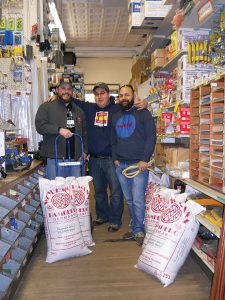
Homebrewing, much like baking, requires specific things you need to get the recipe made from start to finish, Talman says.
“It’s an easy hobby to sell, since the homebrew starter kits come with the majority of things anyone would need,” he says. “A kit includes a fermenter, a bottling bucket and a capper, as well as the ingredients needed to brew a specific type of beer.”
At both Karp’s Hardware and Homebrew and Brewer’s True Value, customers can find homebrew equipment and the ingredients needed to make different types of beers.
The four primary ingredients to stock include malt extract, grains and malted barley, hops and yeast. Brewer’s True Value stocks all of these ingredients, and customers can browse the aisles to select exactly what ingredients they’ll need.
Other items, like glass bottles, jugs and bottle caps are needed to finish homebrew projects.
For a better understanding of the homebrewing niche and to offer training for employees and management, click here to watch the videos “Homebrewing FAQs” and “Homebrewing Essentials.”
Although hardware distributors may sell some of the items or materials a customer might need to homebrew, both Talman and Brewer recommend finding a distributor that specializes in beer making.
To ensure customers come back to shop the department, it’s important to provide a good first impression. At Brewer’s True Value, when a customer is near the homebrew department, they know it. Clear signage and well-merchandised endcaps call out to customers and encourage them to stop and walk around.
The homebrew area has old-time beer posters, pamphlets with educational information, clear signage that labels the different ingredients and more. This allows customers to quickly and easily find whatever it is they need.
Become the Homebrew Expert
 One of the key components to becoming a successful homebrew supplier is to have experts on staff. They can get new homebrewers started and support established homebrewers who may have more advanced needs or questions.
One of the key components to becoming a successful homebrew supplier is to have experts on staff. They can get new homebrewers started and support established homebrewers who may have more advanced needs or questions.
“The most important thing is to have one person well grounded in the ability to homebrew and who knows the nuances of the craft,” Talman says. “At my store, I am that person. The second most important thing is to have a few employees familiar with the process who have prior homebrewing experience. We’ll have demos in our store, and not only are these helpful for customers, but they are also great for our employees, because there is no better way to understand homebrewing than to do it yourself.”
At Brewer’s True Value, two other employees are well-versed in the homebrewing category. This ensures there is always someone to help a customer, even when Brewer is away on nights and weekends.
While Brewer says all individuals have their own way of homebrewing, there are basic steps to follow. When training employees in homebrewing, you should make sure they understand these basic steps and can lead customers in the right direction.
“Make sure you have someone who can champion the homebrew category,” Brewer says. “If you get involved with local homebrew clubs, you can find people to help.”
To take education to the next level, Brewer hosts introductory beer-making classes at the store each month to show people how to homebrew. He caps class sizes at 16 people.
Talman doesn’t typically host events at his store; however, he has offered demonstrations at various locations in town, like at local breweries and the local library.
These events attract people who are interested in homebrewing and let them know that Karp’s Hardware and Homebrew is where they can find the products they need.
Joining the (Homebrew) Community
One of the reasons people are continually drawn to homebrewing is the social element of the hobby.
“Homebrewing is very much a group-focused hobby,” Talman says. “The friendships and social aspect of homebrewing are part of the reason why people get started.”
With more than 1.2 million people who brew their own beer at home in the U.S., communities of homebrewers are found all over the country, according to the American Association of Homebrewers (AHA).
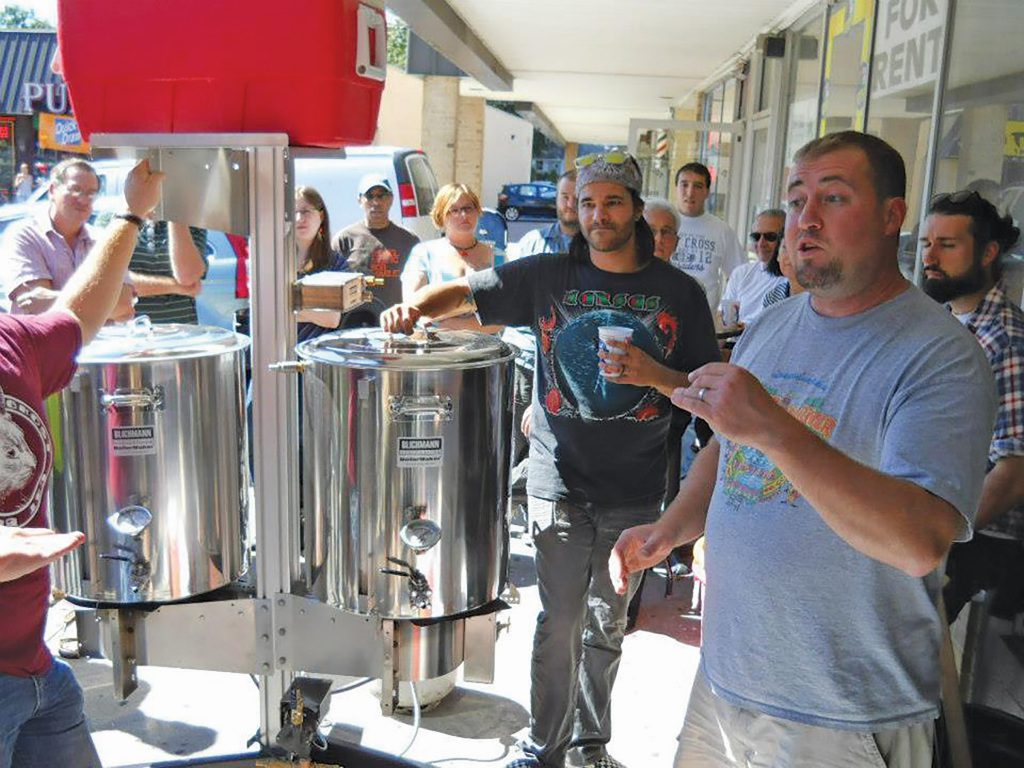
Whether you’re just kicking your homebrew supply business off the ground or are interested in discovering homebrew groups in your hometown, the AHA is able to connect you to anything you’d want to find.
With more than 46,000 members, the AHA works to promote the hobby and offer educational opportunities as well.
It works in conjunction with retailers who sell homebrew equipment to host events and lists homebrew retailers on its website.
Hardware Retailing spoke with Steve Parr, assistant director of the AHA, to learn more about the association. Parr also shares how the AHA can support hardware retailers involved in the homebrew hobby. To read the full Q&A, click here.
Talman says attending a local homebrewing group event is a great way to become familiar with the hobby and to get to know homebrewers in your community.
“If you’re not well-connected with a local homebrew group, if you don’t contribute products, if people aren’t bringing you beers to taste, you might want to get a better relationship built with the local homebrew community,” Talman says. “That might mean sending a young employee to their events or sending them on a homebrew trip.”
To find a homebrew club in your area, head to HomebrewersAssociation.org and select “Clubs” under the “Community” tab.
For Brewer, becoming involved in the AHA has helped him learn more about the homebrewing hobby. Plus, it has connected him to homebrew groups in his area. In addition to attending the events and hosting his own homebrew classes and events at his store, Brewer enjoys attending the AHA Conference.
“A lot of vendors are there, and there are many seminars on techniques and trends in the industry that I gain a lot from,” he says.
The interest in the hobby is yearlong at Brewer’s True Value. And the community of local homebrewers he knows frequently shop at his store.
“Homebrewing is a hobby many people enjoy, probably because you get to be creative with new beers and try out a wide variety of styles and types of beers,” Brewer says. “Creating a beer and sharing it with friends is an interactive hobby that has made the homebrewing community so much fun. The social aspect of homebrewing is a big key to its success.”
 Hardware Retailing The Industry's Source for Insights and Information
Hardware Retailing The Industry's Source for Insights and Information



